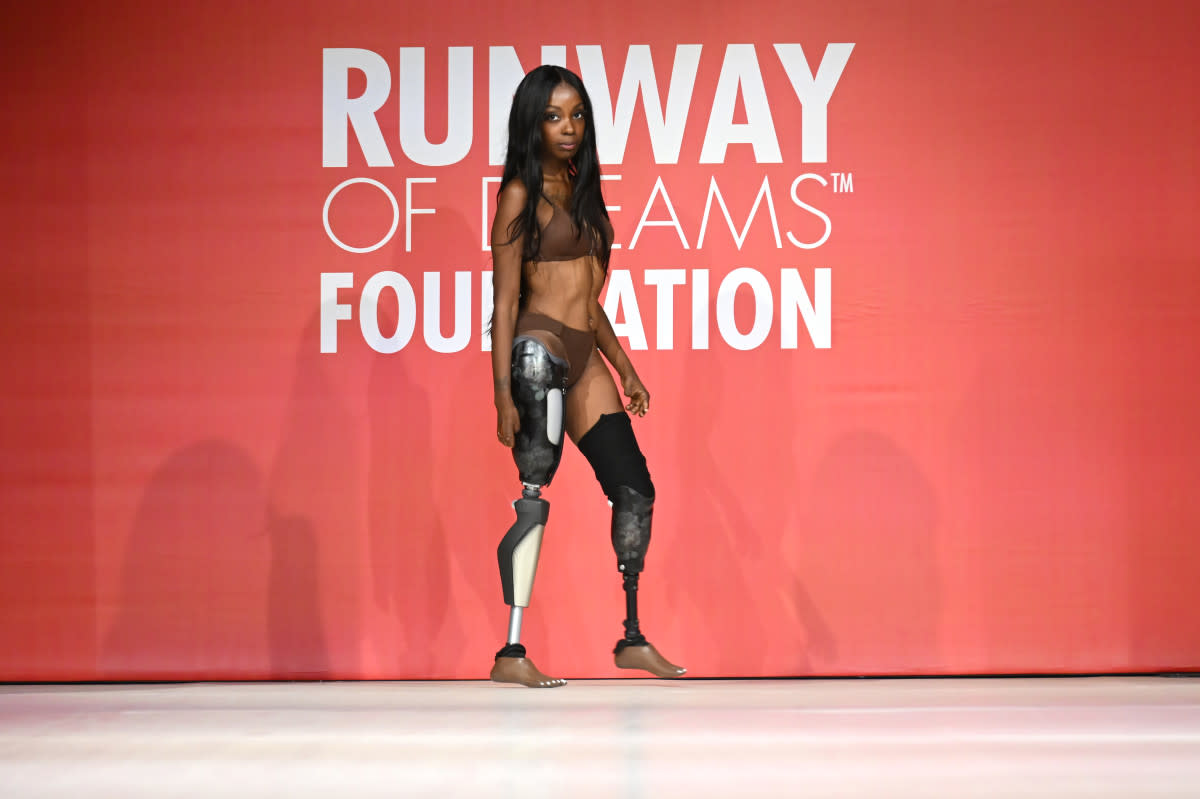Victoria's Secret Debuts Its First-Ever Adaptive Intimates Line

Photo: Noam Galai/Getty Images for Runway of Dreams
Victoria's Secret has spent the last few years merely teasing its efforts to be a more inclusive, approachable brand, following a history of unsavory comments from former executives and a lack of inclusivity, both internally and externally. The lingerie giant has long faced criticism for its approach to body diversity (or lack thereof), but after its major controversies in 2019, models perceived to be representative of a broader range of people started to get hired — a move many hoped would be a turn in the right direction. It also cleaned house, hiring a slate of new leaders and undergoing a well-publicized rebrand. Still, a huge group was still missing from this conversation: customers with disabilities.
Despite a handful of appearances in its campaigns, Victoria's Secret had never made a concerted effort to cater to disabled people when it came to product. That is, until now.
Lydia Smith, who was appointed Chief Diversity Officer of Victoria's Secret in 2021, recalls attending an event hosted by Runway of Dreams, a public charity that stages runway shows to platform brands with adaptive lines and support emerging adaptive designers: "I can't tell you how many women came up to me and said, 'The one thing we don't have that we would love is an adaptive bra,'" she says.
Luckily, Runway of Dreams Founder Mindy Scheier is also the founder of Gamut Talent Management, a consulting group that "helps companies find authentic ways to engage with, create products for and represent people with disabilities," according to its website. The organization has also helped brands like Tommy Hilfiger, Target, Adidas and more develop more inclusive and adaptable clothing for shoppers with disabilities.

Photo: Noam Galai/Getty Images for Runway of Dreams
"Over the past 18 months, Victoria's Secret decided to start working in partnership with Gamut Management because they didn't know who the consumer with a disability was," Scheier tells Fashionista. "They needed to be educated. They needed to understand what this consumer's needs were before they even started making the product. That's when we started working with them, pulling women with all different types of disabilities so that the product was authentically designed with and for women with disabilities."
After a year of focus groups, development and design meetings, Victoria's Secret officially debuted its first adaptive line on the Runway of Dreams runway on Wednesday evening, on the last day of New York Fashion Week (which the brand also kicked off with a star-studded event teasing its upcoming show, the VS World Tour). The marquee product is a new bra that, instead of a hook-and-eye closure at the back, has strong magnets at the center, for a more accessible experience of getting dressed, and buckles to adjust its straps at the front, for easier reach.
"One of the amazing examples in one of our focus groups was a man who had cerebral palsy, and he was talking about the lack of intimacy he had with his wife because he couldn't get her bra off," says Smith. "Now, his able-bodied wife can wear the bra, but it's something that he'll be able to take off. I remember being in tears when I heard that, because I would've never thought about how having a disability could really impact the intimacy in a relationship."

Photo: Noam Galai/Getty Images for Runway of Dreams
The impact of the new adaptive line is already being felt by those wearing the products. Bri Scalesse, a New York-based model who uses a wheelchair, tells Fashionista: "I've always loved Victoria's Secret. Growing up, I would always watch the shows, but I never saw any bodies that looked like mine. I didn't see that representation. To see how Victoria's Secret has rebranded and is celebrating more bodies, it's just something that my younger self could have never even imagined... The bra is comfortable and it's sexy. I want to wear this, and I can see myself wearing it as lingerie, so I love it."
Shoppers will be able to test, try and purchase the Victoria's Secret adaptive line starting in October. It'll be available in select stores, as well as online at victoriassecret.com.
Smith knows this is only the beginning for the work Victoria's Secret needs to still do, and admits that a fear of not being able to make something perfect for every disability caused some apprehension at first.
"We want to be perfect, and if we can't meet everyone's needs, then you kind of talk yourself out of starting," she says. "That was one of the most important things in our partnership with Gamut, encouraging us to get started. We know there will always be more work to do."
Please note: Occasionally, we use affiliate links on our site. This in no way affects our editorial decision-making.
Want the latest fashion industry news first? Sign up for our daily newsletter.

